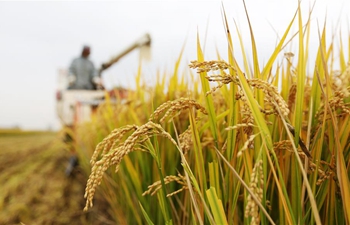BEIJING, Oct. 9 (Xinhua) -- China's week-long National Day holiday, which ended Sunday, has triggered a tourism and consumption boom, making it a "Golden Week" for both China and other countries.
The following are some facts and figures about the Golden Week that evidence continued growth in the country's domestic consumption rates, demonstrating strong economic resilience:
AN ENGINE GAINING NEW STEAM
-- Chinese tourists made 726 million visits to parks, scenic spots, museums, concerts and other attractions at home during the holiday, up 9.43 percent from the same period of 2017, according to data from the Ministry of Culture and Tourism.
-- The country's tourism sector earned total revenue of 599.08 billion yuan (about 86.8 billion U.S. dollars) during the period, a rise of 9.04 percent from one year earlier.
-- Retail and catering industries reaped combined revenue of 1.4 trillion yuan (203 billion U.S. dollars) during the period, up 9.5 percent from one year earlier, according to data from the Ministry of Commerce.
Although the pace of growth moderated compared with previous years, a breakdown analysis of the data points to continued consumption upgrading, with consumers spending more on high-end products and services, analysts said.
Besides consumer goods, Nicholas Lardy, an economist with the Peterson Institute for International Economics, said China's large and still-growing middle class has been spending a growing share of its rising income on education, health care, travel and other services.
Huang Zhilong, an analyst with the Suning Institute of Finance, estimates that service consumption has risen to account for about half of China's household spending.
This comes as China seeks high-quality development that draws more strength from domestic consumption, innovation and the service sector.
Efforts have been paying off. Consumption contributed to 78.5 percent of economic expansion in the first half of this year, up from 58.8 percent in 2017.
With more measures to boost consumption, including income tax adjustments, lowering import tariffs and the upcoming China International Import Expo, domestic demand has great potential to continue growth, said Chen Lifen, a researcher with the Ministry of Commerce.
A BOON TO REST OF WORLD
China's National Day holiday has also triggered a global tourism boom. Data from the National Immigration Administration showed on Oct. 1-7, the number of outbound Chinese travelers rose 8.2 percent year on year to 6.94 million.
According to bookings on Tuniu.com, a leading Chinese online travel service provider, 46 percent of tourists traveled abroad during the holiday, with France, Italy and Switzerland ranking as the top three most-favored destinations for long-distance tours while Japan, Thailand and Vietnam ranked as the most-favored destinations for short-distance outbound tours.
China has remained the world's largest source of outbound tourists for five consecutive years. Its outbound travelers contributed nearly one-fifth of the 1.34-trillion-dollar international tourism revenue in 2017, according to the United Nations World Tourism Organization.
Huang Zhilong said China's outbound tourism is still in the primary stage of a fast expansion period, and expects the number of outbound tourists to exceed 150 million in 2018, up from 131 million in 2017.
According to Alibaba's e-commerce platform Tmall, total turnover from the sales of imported products during the first three days of the holiday doubled from one year earlier, with Japan, the United States and the Republic of Korea being the top three exporters. Enditem

















